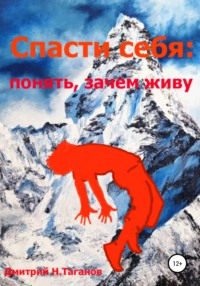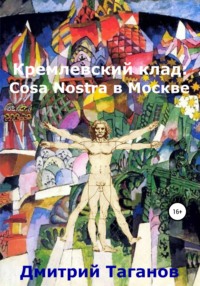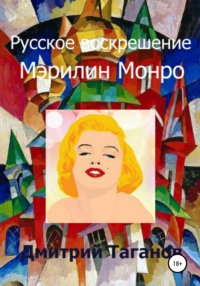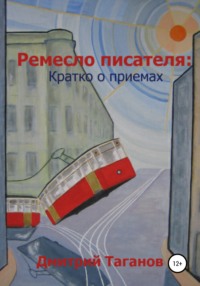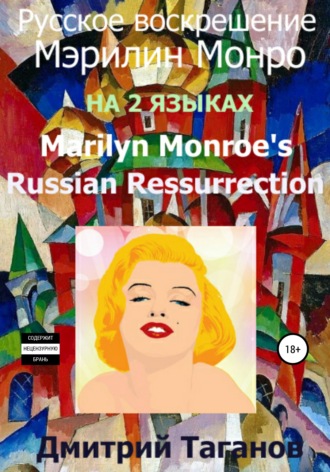
Полная версия
Русское воскрешение Мэрилин Монро. На 2 языках
Finally, Fomin looked at his watch, and with his eyes gave a sign to Myacheva. The woman suddenly roused herself, “Marilyn, my dear, your Daddy is tired, he needs some rest, and we should go. Come with me, I’ll help you to tidy up. Come, my dear.”
Obediently Marilyn followed Myacheva out the door. The old man was still chewing a grape with his toothless mouth, and Fomin cleared his throat.
– Александр Иванович, он прилетает через два дня, – сказал негромко Фомин и выпрямился.
Старик перестал жевать и вскинул глаза.
– И что вы теперь от меня хотите? – старик действительно устал, он с трудом говорил.
– Все то же самое, Александр Иванович. – Все то же самое.
– Он взрослый человек, а я дряхлый умирающий старик.
– Он послушает вас. Он не может не посчитаться с вашим… требованием.
– Требованием? Я не требовал у него ничего и ни разу за все пятьдесят его лет.
– Тогда все его пятьдесят лет, а заодно и ваши двадцать пять, полетят коту под хвост. Вы тогда напрасно страдали. Вы напрасно жили! А вы подумали о миллионах, миллиардах трудящихся всего мира? Вы не исполните тогда предсмертного поручения, которое вам дал наш последний и настоящий Генеральный секретарь компартии Советского Союза. Вы обманите чаяния всех коммунистов мира! Вам история этого никогда не простит. Все станет известно очень скоро, и вы покроете себя позором еще при жизни!
“Alexander Ivanovich, he arrives in two days,” said Fomin and straightened his back.
The old man ceased chewing and looked up. “So what do you want of me?” He looked really tired, breathing heavily.
“Same thing, Dr. Sedov. Nothing new.”
“He is a mature adult, and I’m a feeble dying man.”
“He will listen to you and do whatever you ask, and you perfectly know that. He wouldn’t decline your demand.”
“Demand? I’ve never demanded anything of him in fifty years. Not a thing!”
“If it’s so, I’m afraid, you wasted these fifty years of his, and twenty five of yours. You lived in vain! You suffered in vain! Why don’t you think of millions, billions of working people around the world? Shame! Thus you will break the promise you had given to the late Secretary General of the Communist Party of the Soviet Union. You will betray the hopes of all the Communists of the world! The history will never forgive it to you. That will bring shame on you for the years to come!”
– Хорошо, я поговорю с ним, – сказал старик и устало закрыл глаза. – А теперь оставьте меня…
– Самое последнее…, извините. Может быть, вы все-таки согласитесь переехать из этой нищей богадельни к нам, в коттедж? А то перед людьми как-то неудобно.
– Ни в коем случае!
Женщин Фомин встретил в коридоре, и сказал им только:
– Папа очень устал. Не надо с ним прощаться, поедем.
В вестибюле он увидал старенькую сиделку их старика и подошел к ней.
– Здравствуйте. Мы видели его. Он очень плох. Вот, возьмите еще на расходы. Не жалейте на него ничего.
– Спасибо вам, тут так много… Спасибо.
Уже когда их «БМВ» выехал на ровный асфальт, Фомин повернулся к Мэрилин и негромко сказал:
– Твой брат прилетает в Москву послезавтра.
Услыхав это, сидевшая рядом, за Мэрилин, Мячева издала сдавленное, но громкое «А-а» и схватилась обеими руками за грудь.
“Okay, I’ll talk to him,” simply said the old man and tiredly closed the eyes. “It’s for him to decide. Please, leave me now.”
“And one last thing, excuse me. Please, allow us to move you out of this impoverished refuge to our cottage? We feel ashamed you live in such a hole.”
“Never! And don’t ever mention it to me.”
Fomin left the room, then waited for his women in the corridor and said to them, “He is very tired, no need to disturb him with farewells, let's go.”
Down in the lobby Fomin met the nurse that looked after the old man, and said to her, “We’ve just visited him, he looks worse. Here, take it for expenses, and feel free with this money.”
When their car reached a smoother road, Fomin turned to Marilyn and said softly, “Your elder brother arrives the day after tomorrow.”
Having heard these words, Myacheva, who sat by Marilyn, uttered a constrained shriek and grasped her breasts with both hands.
7. Предсмертное поручение / The Mission Assigned from Death-bed
Оставшийся в полунищенском Доме престарелых старик, носивший теперь чужую фамилию Седов, был на самом деле легендарным академиком, светилом советской науки, орденоносцем, и даже членом Центрального Комитета компартии Советского Союза. Но было это тридцать лет тому назад.
The old man, who was left at the impoverished home for the aged, and who was known by false name Sedov, was actually the legendary academician, a star of the Soviet science, a proud recipient of the numerous government rewards, and also a former member Central Committee of the Communist Party of the Soviet Union. That was a career-zenith anyone could dream of in this country, but that was thirty years ago.
Как ученый он занимался тогда загадкой органической жизни, но как член ЦК компартии курировал все области биологии и даже химии в десятках академических институтов. В начале восьмидесятых институт под его непосредственным руководством вышел на эпохальное открытие, которое он не только не решился нигде опубликовать, он даже не обмолвился словом об этом с коллегами за стенами его лаборатории. И правильно сделал.
As a scientist Sedov was occupied then by the mysteries of organic life, but as the member of Ts-Ka of his Party he administered all fields of biology and its researches in dozens of laboratories and institutions. In the early eighties the famous laboratory under his direct leadership was on the verge of epochal discovery, which could bring results worthy of Nobel Prize. Although, Sedov refused to publish anything; he and his colleagues never uttered a word about the matter of their research outside their laboratory. That was very right thing to do, as it would have had revealed later.
Речь шла о клонировании. Неотличимом, как бы факсимильном копировании на молекулярном и генетическом уровне любых живых существ. Где-то в мире уже пробовали похожее: клонировали овечек, собачек и прочих животных, но те долго не жили и вскоре умирали. Но советский академик-коммунист мог теперь клонировать, – ксерокопировать и чуть ли ни отправлять по факсу – Человека. Требовались только обрезки его ногтей или волос, да пара мазков из интимных мест – его или близких родственников. Но если можно было получить что-нибудь из его собственных внутренностей, или из головы, то было еще лучше.
The theme of their epochal discovery was the cloning, that is indistinguishable, as facsimile copying of any living beings, but at the molecular and genetic level. There was some experimenting with cloning also abroad; cloned lambs, doggies and other animals were born in some laboratories, but they didn’t live long and died in extreme anguish. Soviet renowned scientist and ardent communist Sedov attained then an unbelievable advancement in genetics and practical cloning; he could not just clone, but could now make some sort of fax-copies, and almost send them by wire – of the human beings. To make a perfect human clone he needed just clipped off scraps of nails or a lock of hair, and a pair of smears taken from the private parts, preferably of original human person’s, but his immediate kin’s would also could do. The clone would turn out healthier if could be used tissues of his intestines, but still better from his head.
Почувствовав холодок в позвоночнике от открывающихся перспектив своего открытия, академик мгновенно засекретил все материалы по этим темам на уровне Первого отдела своего института. На следующий же день он, как член ЦК, записался на прием к тогдашнему шефу всесильного КГБ товарищу Юрию Андропову.
Через неделю он вошел к нему в кабинет на Лубянке, спокойным и уверенным шагом. Академик рассказывал, объяснял, как умел, самым простым языком, а тот только молча и терпеливо смотрел на него сквозь очки, не задавая никаких вопросов. Но потом он прервал академика на полуслове.
– Кого вы хотите клонировать первым?
Having felt a chill in a backbone at the prospects of his discovery, the academician instantly proclaimed all information on this subject as classified material. He called the First department of his laboratory, a branch of secret police KGB, to be the watchdog of his top secret research. The next day Sedov, as a member of Party’s Central Committee, applied for an appointment with the powerful chief of Soviet secret police KGB, comrade Yuri Andropov. In a week Sedov entered with self-assured stride the office in the most dreaded building during gulag years on Lubyanka square.
The academician explained KGB chief as simply as he could the essence of his discovery. The tall elderly man just silently and patiently watched him through his glasses, asking no questions. Then he suddenly cut short the academician, “Whom do you intend to clone first?”
Академик запнулся. Он никогда не думал о первых подопытных, как о людях с именем и фамилией, они представлялись ему всегда, как ученому, чистыми и голыми, как Адам и Ева.
– Мы не думали еще о самых первых. Я полагаю, это оставить на усмотрение руководства нашей партии.
– Хорошо. А вы можете копировать, клонировать, или как это вы зовете, – словом, оживить всех старых большевиков, умерщвленных Иосифом Сталиным? Всю старую гвардию, без исключения.
Academician faltered: he never thought of that. At least he never thought about his human clones as of real people with regular names and surnames of their prototypes. Being a scientist, he always imagined them being nude and virgin as biblical Adam and Eva.
“Well, we haven’t yet planned that. I mean … may our Party decide that, because of immense importance and implied consequences of such action.”
“OK, can you clone, or copy, or whatever – can you resurrect all the Old Bolsheviks massacred by Joseph Stalin? Can you resurrect entire old Lenin’s guard?”
– Я думаю, да… можно попробовать… – оторопев, ответил академик.
– Нам теперь как никогда, как воздух нужен их энтузиазм, революционный порыв и большевистское мужество.
– Да, мы это сможем сделать, – отчеканил с подъемом академик. – Их генетический материал был дальновидно и надежно сохранен советскими учеными. Он в отличном состоянии: ткани тела, срезы мозга…
– Хорошо. Пока об этом никому. Вы поняли? Теперь это государственная тайна. О моем решении вам сообщат. Пока идите и работайте.
Struck dumb, scientist said, “I think, yes, we can possibly try. Why?”
“These days of moral decay we need as never before, as an air in our lungs, their enthusiasm, their revolutionary gust, their Bolshevist courage. They would kind of vaccinate all of us, all our country. They would inspire our Party with a new life, with a new flame and ideas!”
“Yes, comrade Andropov, we could do this, that is a great honor for us,” uttered the academician, coining the words. “Their genetics materials had been wisely preserved with an incredible far-sight by Soviet scientists in the twenties; it’s in excellent condition: the body tissues, brain slices. I know it as a curator of Organics laboratory which oversee the body of immortal Lenin in his mausoleum.”
“Fine. Yet, don’t you breathe a word to anyone. Do you understand? All I said is a top state secret. You will be informed of my decision. Go to your work, and don’t waste any time.”
Академик ждал, когда ему об этом сообщат, почти год. И вот действующий генсек, правивший страной более двадцати лет, сошел в могилу у кремлевской стены на Красной площади. И следующим, Третьим за историю, генсеком был избран в политбюро партии бывший шеф КГБ товарищ Юрий Андропов.
Academician waited nearly a year for this decision to be relayed to him, but the government-direct-line telephone in his office, vertushka, was silent. Suddenly – as can be sudden the death of a sick eighty-year old – died current Secretary General who ruled the country for more than twenty years. It also triggered the coming death-harvesting of gerontokratia in the Party’s Politburo. He was buried with a pomp and artillery salutation in the grave near the Kremlin wall on the Red Square. The next Secretary General, the third in history of the Party, was elected by the intimate circle of old members of Politburo. They elected KGB chief Yuri Andropov.
Академик сразу объявил тогда в своей лаборатории готовность номер один. Но и без этого все давно было готово. Не имея еще прямого поручения сверху, он давно сумел, пользуясь своим положением члена ЦК, достать срезы мозга и образцы тканей почти всех, из ленинского окружения начала двадцатых годов. Всей легендарной ленинской гвардии большевиков, загубленной Иосифом Сталиным. И не только их. В его криокамерах теперь хранились, и были готовы для первичных экспериментов, ткани многих великих поэтов и ученых. Почти все это поступило из бывшего Института Мозга, куда в двадцатых и тридцатых годах отправляли в тазиках мозги всей тогдашней элиты: для взвешивания и изучения. Полагали, что раскрытие тайны человеческого гения было делом первостепенной важности для молодой советской науки. Для этого института не пожалели даже золота в те голодные годы и купили для него в Германии удивительную машину. Она срезала тончайшие, почти прозрачные слои человеческого мозга, один за другим, как ветчину в хорошем магазине. К сожалению, разглядеть в полупрозрачных розовых пленках загадку человеческого интеллекта так и не удалось. Но их хранили, как величайшее сокровище, каждую пленку между двух стекол, в высоких красивых шкафах из полированного дерева.
When academician saw a foot-high photo of the new Secretary General in the party paper Pravda he announced top alert warning in his laboratory, though everything was ready months ago. All the previous year, not yet having any directives from above, the academician, using his position of a member of the Central Committee, could manage to get the cuts of the brain and samples of body tissues of almost all Lenin inner circle Bolsheviks of early twenties, of all legendary Lenin “Old guard” ruined later by Joseph Stalin. In his hyper-freezers were also stored now ready for initial experiments the tissues of great poets and scientists of the country. All these precious materials came from the Institute of Brain, laboratory, organized by Bolsheviks, and which received in mandatory manner the brains of all the state’s elite who died in the twenties and the thirties of natural causes or not. These brains came, and that was registered by photographs, in a shallow bathroom basins, covered with plain towels, for consequent weighing, cutting into paper-thin slices, and then a profound research. It was universally believed that disclosing of the mystery of human genius was a matter of paramount importance for a young Soviet science. In those famine-years, when millions died deprived of the bread that was sold abroad for machinery for the industrialization, this Institute of Brain was granted precious death-tolled gold to purchase in Germany a marvelous machine that could cut off finest, almost transparent layers of human brain, as a ham in a food store. Of course, those scientists didn’t decipher the riddle of human intelligence with those translucent pink-colored films, but, nevertheless, they stored them as a priceless treasure, each one between two glasses, inside of the tall beautiful cabinets of polished walnut.
Команды академику сверху или, по крайне мере, вызова туда для доклада, все не поступало. Так прошел еще год. Но вскоре академику и его лаборатории стало не до того. Из Афганистана в страну пошли неторопливым траурным графиком вагоны-рефрижераторы с грузом «200». Не с обычным, а с обожженным или разорванным в куски и лохмотья, и поэтому неузнаваемым, не имеющим ни имен, ни фамилий. Академик и весь его институт теперь употребляли свои знания и опыт только на генетическую экспертизу останков, для установления личности каждого, чтобы отдать павшим героям последние почести.
Yet, months were elapsing, but the academician’s team didn’t get any commands from above. A year passed in a strained waiting, although quite suddenly academician and his lab forgot all about their ambitious dreams. From the remote Afghanistan to their country commenced to arrive on leisurely schedule long trains of refrigerators loaded with the cargo 200. That was the designation for casualties, coined at that time and became regular in later post-Soviet bloody clashes. Cargo 200 from Afghanistan directly affected academician and his laboratory, though not all of it, but only hundreds of burnt or torn to tatters, and hence unrecognizable remains, having neither names nor faces. Academician and his lab plunged into the enormous work of their identification. Only their organics lab had sophisticated genetics expertise for this job, to determine the identity of everyone in order to pay last tribute to these fallen heroes.
Только в конце восемьдесят третьего года, перед самым Новым годом, неожиданно позвонили из секретариата ЦК. Но академика вызывали не в Кремль и не в здание ЦК на Старой площади. Он должен был прибыть в Центральную клиническую больницу. Для встречи лично с генсеком Юрием Андроповым.
But all of a sudden at the end of the nineteen eighty three, on the New Year eve, academician had an unexpected call from the Secretariat of Central Committee and was summoned at long last to the Secretary General. But what seemed to the academician very alarming, he was called not to the Kremlin, or Central Committee building, or any of suburban residences. He was to arrive at the Central Hospital, to meet Secretary General Yuri Andropov privately. Of course, it was implied the top secrecy of Yuri Andropov’s whereabouts.
В ранние декабрьские сумерки его черная «Волга» миновала шлагбаум КПП, на малой почтительной скорости скользнула по заснеженной березовой аллее и остановилась около главной в стране больницы. Надев белый халат, академик молча последовал за дежурным врачом и личным помощником генсека по пустынным широким коридорам. По пути только почтительно вставали из-за своих столов офицеры охраны и медицинские сестры. Перед дверью одной из палат его оставили одного, и в больничной тишине он услыхал, как громко бьется его сердце. Наконец, его пригласили войти.
In the early December twilight academician’s chauffeur-driven black Volga passed a check point barrier, then slowly and respectfully moved through snow-covered birch alley and stopped at the entrance of this foremost hospital in the country. Having put on a hospital gown, academician silently followed the assistant to the Secretary General and his on-duty doctor, passing desolate hushed corridors. On their way Security officers and the nurses stood up respectfully at their desks. Three of them stopped at one of the wards, the academician was asked to wait and his escort entered the door. In a motionless silence the academician has distinctly heard the loud beating of his heart. In five minutes he was asked to enter the ward, too.
Он не сразу рассмотрел генсека. В палате было сумеречно, несколько неярких ламп освещали только аппаратуру у стены, столы с медикаментами и стеклянными приборами. Он рассмотрел сначала широкую, специальную кровать, больного в ней, и блестящие гибкие трубки, уходившие под простыни из большого аппарата, стоявшего на полу в углу палаты. Затем, увидал синюшное, одутловатое лицо, глубоко утопленное в подушке. Он не сразу и узнал генсека, которого больше помнил по портретам в газетах. Но в эту вторую их встречу генсек сразу улыбнулся ему, приподнял с кровати руку и сделал ею дружеский, приглашающий присесть жест. Академик присел на стул рядом с кроватью, теряясь, как ему почтительней вести себя с больным. Но генсек неожиданно громко для больничной палаты заговорил первым.
The academician didn’t immediately make out Secretary General in a dim ward. It was really dark there with just a few gloomy lamps illuminating sophisticated equipment by the walls, and the cabinets full of drugs. At first, with his eyes adapting to darkness, he made out the wide, specialized bed, then a frigid figure of the patient under the covers and the glittering flexible tubing diving under his blankets from the huge apparatus by adjacent wall. Only then the academician noticed cyanotic and bloated face, deep in the pillows. He didn’t immediately recognize Secretary General, because he remembered his face mainly as he saw it in the newspapers, but they of course published retouched photos shot several years ago. Unexpectedly this time, at his second encounter with Secretary General, the latter was the first one to smile. He raised just a little his hand and made a friendly sign to sit down. The academician had sat shyly on a chair by his bedside, being lost as to how respectfully behave with this patient, and what the words were appropriate in the circumstances. But the Secretary General was the first to address him, unexpectedly loudly for the hospital ward.
– Давненько мы с вами не виделись…
– Добрый вечер. Как ваше здоровье, товарищ Андропов?
– Какое теперь здоровье! Нет у меня больше здоровья.
С разговором, академик почувствовал себя уверенней, глаза его привыкали к семеркам палаты, и краем глаза он рассмотрел большой белый аппарат в углу, от которого тянулись к генсеку трубки. Аппарат мерно вздыхал с мягким металлическим шелестом, и изнутри слышалось бульканье жидкости. Он догадался, что это была искусственная почка, но видел такой аппарат в работе впервые.
“Long time we haven’t seen each other.”
“Good evening, comrade Andropov. How’s your health?”
“What health do you mention? I got no health any more.”
With the small talk the academician felt himself more confidently, his eyes got accustomed to the dusk, and he secretly examined the large white apparatus in the corner connected to General Secretary by flexible tubing. The apparatus sighed deeply with soft metallic murmur and a distinct liquid gurgling inside it. The academician has heard the rumors that the sick kidneys plagued the Secretary General and that seemed true. He realized that the sighing apparatus was an artificial kidney; he never saw such a sophisticated thing before.
Генсек перевел взгляд на помощника, стоявшего у двери и сказал:
– Поставьте нам что-нибудь джазовое. Дюка Эллингтона.
Помощник подошел к столу, на котором стоял стереопроигрыватель, выбрал и вынул из конверта виниловую пластинку, поставил ее на вертушку. В палате зазвучал джазовый саксофон.
– Немного громче, – сказал генсек, и саксофон зазвучал громко даже для гостиной в квартире. – Так хорошо. Идите.
General Secretary looked at his assistant sitting at the desk by the door and said softly, “Let’s hear something jazzy. Yeah, put the disk of Duke Ellington for us.”
The assistant went to the side table with a record-player, picked up from the stack on the shelf a vinyl record and put it on the turntable. The ward’s tranquility was pierced by tenor saxophone.
“Louder, please,” said the Secretary General, and the saxophone resonated too loud even for apartment parlor. “That’s fine. You can go.”
Как член ЦК, академик знал о некоторых личных интересах их лидера. Знал, что тот был первым из череды коммунистических вождей, кто понимал музыку, предпочитал классический джаз, и даже сам собирал коллекцию пластинок. Но этот громкий джаз в больничной палате, около вздыхающей искусственной почки, мог означать только старый проверенный способ партийцев защитить их разговор от прослушивания. Начиная с тридцатых годов, все сколько-нибудь важные разговоры в комнатах советские граждане вели только при громко включенном радиоприемнике.
As a member of the Central Committee academician knew about some of personal interests of their leader. Andropov was the first in a succession of Communist leaders who understood music preferring classical jazz, and he even purchased abroad through the state’s Embassies a vast record collection. But this flashy and too loud for a hospital ward jazz music could mean only the reliable and sure way to protect their conversation from eavesdropping, that was frequently used by party’s members from revolutionary days. In the thirties, those deadly gulag years, and even later, all somewhat serious talks the Soviet people normally accompanied with the loud noise of the radio broadcasts.



